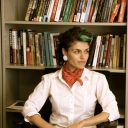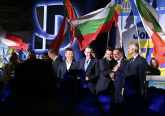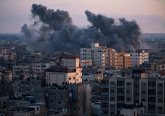On May 31 2011 Dr Daoudy shared her thoughts about the events in Syria with St. Antony’s students and faculty over a lunch seminar organised by Warden MacMillan. Ever since it started at the end of January, the Syrian uprising has been continuously in the news. Dr Daoudy discussed the opposition, the army, and the potential future scenarios for Syria.
The opposition, it shares some characteristics with that of Egypt and Tunisia. It’s led by youth with no overriding ideology or religious affiliation. Dr Daoudy points out that the advantage of this type of opposition is that it can be labeled as anything, but the disadvantage is the lack of leadership and the inherent divisions within the opposition movement. The recent meeting of the Syrian opposition in Antalya (Turkey) confirms these issues, as some prominent opposition leaders and regime critics, such as Burhan Ghalioun, did not attend it, for fear of takeover by foreign interests.
Involvement of the army in the Egyptian revolution by refraining from the use of violence, does not seem to be replicated in Syria. While some soldiers from the lower ranks of the security apparatus have defected and refused to kill civilians, Dr Daoudy asserts that the top leadership is still loyal to the regime. In fact, the head of the powerful fourth armoured division and the Republican Guard, Maher al-Assad, is the youngest brother of President Bashar. He is believed to be in charge of the repression campaigns.
As for future scenarios, Dr Daoudy suggested that a dialogue between the opposition and the regime at this point is improbable. It is now evident that the regime is determined to fight till the end, and will not make serious political compromises. At the same time, there is a possibility for the opposition to resort to armed resistance. This might create a Libya scenario. Daoudy thinks that though civil war is looming, Syria has no history of sectarian strife. As a positive development of this uprising, Dr Daoudy noted the creation of a culture of resistance across all communities and religions, which may survive into the future. The change in the mentality of young Syria people is a significant development in-an-of itself.
During the Q&A session, there were a lot of questions about the potential for international community to influence Syria uprising. Dr Daoudy was highly sceptical of the role of the West, especially of the EU. Firstly, the EU does not have a unified Middle East policy, and typically copies the actions of the US. The US is currently preoccupied with Libya, and cannot afford a serious involvement in Syria. Secondly, unlike Lybia, Syrian opposition groups have all rejected foreign military intervention, which makes it difficult for the EU to justify intervention. Sanctions from the US and the EU have sent a signal to the Syrian regime. Daoudy suggests that EU’s involvement in Syria through civil society could be one helpful mechanism for pressure and change.
Please see Dr Daoudy’s profile at: http://www.politics.ox.ac.uk/index.php/profile/marwa-daoudy.html
Please see previous Dr Daoudy’s media appearances at: http://www.politics.ox.ac.uk/index.php/news/dr-marwa-daoudy-on-syria.html
Maria Repnikova is a DPhil Candidate in Politics at Oxford University and a Graduate Editor of PoliticsinSpires.org. Her research is on comparative politics of China and Russia.








1 Comment
Thank god we have some bright minds like Dr. Marwa!!